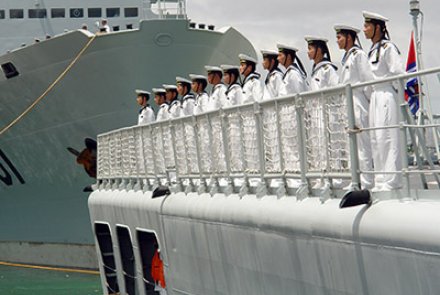
PHOTO: US Navy via Wikimedia
Technology, not geography, makes China a global problem
China’s area of national interest is no longer delineated by geography or confined to its continental region – a fact that has serious geopolitical implications, Roger Bradbury writes.
Paul Keating’s analysis of China’s geopolitical strategy, offered in his 24 December interview with veteran political journalist Paul Kelly, was at once fascinating and provocative. But it was built on a dated conceptual flaw, and so should not go unchallenged. The former Australian Prime Minister imagined a China constrained throughout its long history by its geography, bounded by deserts and mountains with only a relatively short coastline – a continental power – in direct contrast to the US, a global naval power able to project force and protect its interests anywhere in the world. China, he said, “… seeks only to command its near back yard in one ocean, not three oceans.”
Such a China had, in his view, a limited and legitimate sphere of influence – limited to its immediate geographic region, and legitimate because, through its long history, China had always had, and now seeks to regain, that influence over its neighbourhood. Much like the sphere of influence Russia had and now seeks to regain with its ‘near abroad’.
But, he went on, “Unlike the Soviet Union before it, China is not an ideological power seeking to propagate an international ideology. It is a great nation-state but is seeks fundamentally to live within its own precinct. It is not seeking to command three oceans. It is seeking to command the corner of one of them. It doesn’t wish to project power to become the sole superpower.”
This distinction between continental and naval powers, and hence regional and global influence and hegemony, was a 19th century idea that survived into the early 20th century. But it was a thin truth even then, failing to properly acknowledge the role of science and technology in creating a state’s power.
And in the 21st century, it is virtually meaningless – technology trumps geography. Any state that has the wealth, technology and willingness can become a global power. With cyber and space technologies in particular, a global power’s neighbourhood is the whole world.
So two questions arise about China’s geopolitical strategy, and the answers, based on the evidence, are sobering.
The first is: Does China need to be a global power, influencing countries in its global neighbourhood to do what it wants, not what they want? China’s need for resources – particularly food, energy and minerals – says yes. China can brook no threat to its increasing demand for the world’s resources. Whether it is outbidding others for agricultural land, mining tenements or ports in Australia, or building railroads to export food from its farms in Africa, China is already projecting its influence well beyond its traditional neighbourhood.
A rising standard of living, and hence an increasing demand for resources, has become an existential issue for the Communist Party of China. Having dropped any pretence to Marxist ideology, but still authoritarian, its only claim to power and legitimacy is its capacity to improve the standard of living of its citizens. China needs, in an absolute sense, to have unimpeded access to the world’s resources.
The second question is: Given this need, does China have the intent to be a global power? China’s military build-up, and its diplomatic and overseas development initiatives, all say yes. China’s naval shipbuilding program is focused on creating a blue-water navy capable of operating in all the world’s oceans – its submarines, for example, now operate in the Indian Ocean. It has nuclear weapons and can deliver them by air, land and sea. It has an expanding military space program and a well-known offensive cyber capacity. Each of these military capabilities speaks to the application of advanced technology rather than geography. And each has, or soon will have, global reach.
This global military reach goes hand-in-hand with China’s assertive diplomatic and overseas development initiatives, especially its One Belt, One Road project and its closely related Asian Infrastructure Investment Bank. Through these initiatives, China is attempting to create a web of economic interconnections among Eurasian and African countries with itself as the hub. The military spinoffs are substantial, with China gaining access to a set of ports across the Indian Ocean.
These large, extensive, long-term programs all signal a country intent on becoming a global power, one that sees its neighbourhood, and hence legitimate sphere of influence, as the whole world.
With the US, and its fantastic command of advanced technology, remaining, and indeed growing, as a global power, the next few decades are very likely to see two assertive global powers in play. It’s an open question whether they will interact competitively or cooperatively, or perhaps both.
History is a weak guide. There have been instances in the past of both stable and unstable periods with two top dogs, but these were always regional – the Med, the Indus Valley, Central America and so on. Now, for the first time, the game is global, and ‘all the world’s a stage’.
This article was first published by Policy Forum.net, the website of the Asia and the Pacific Policy Society and Crawford School. https://www.policyforum.net/technology-not-geography-makes-china-global-...
Updated: 1 July 2024/Responsible Officer: Crawford Engagement/Page Contact: CAP Web Team













